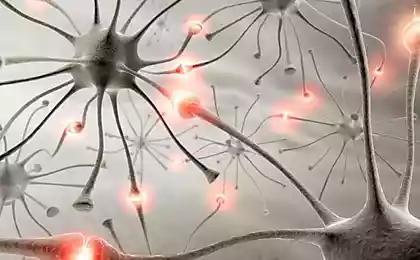447
The thirst for distraction: why the person is bored with himself
More and more people find the symptoms of attention deficit and lack of Internet while traveling or long queues to many it may seem a catastrophe. Decided to blame the pace of modern life and digital technology — but not all scientists believe that only smartphones, social networks and free serials hinder us to show the wonders of concentration and introspection. Perhaps the man by nature bored with yourself? In The Atlantic magazine published an interesting article about new psychological research.

© Horace Nagone
"We, like everyone else, noticed how people are addicted to modern technology, and drew attention to the fact that they seem to avoid to occupy themselves only with their thoughts, — said the head of the study Timothy Wilson from the University of Virginia. — Wondered if this phenomenon is something fundamental about the human ability to entertain themselves. In humans, a huge brain, full of pleasant memories and is able to produce imagination — it's hard to imagine to spend a few minutes alone with yourself can be so hard."
In humans, a huge brain, full of pleasant memories and is able to produce imagination — it's hard to imagine to spend a few minutes alone with yourself can be so hard
A team of scientists conducted 11 experiments, most of which they asked the participants to remove everything that could distract, and entertain yourself only with thoughts for 6-15 minutes. After the first six studies, 58% of participants identified the challenge as average or above average, and 42% admitted that the level of enjoyment of such a pastime was below average. During the seventh study, participants performed the task at home, and 32% admitted that they cheated using their mobile phones, listening to music or doing something else. They appreciated the task as much less enjoyable in comparison with other activities, such as reading a magazine or solving a crossword.
In the most surprising of the study, the participants were given the opportunity to voluntarily give ourselves the discharge of the Taser during the "period of reflection". Before the experiment, they could try the device to see how painful the shock. And yet, even among those who said he was willing to pay, if only to never experience the shock, a quarter of women and two thirds men resorted to him when left alone with their own thoughts (one participant pressed the button 190 times in 15 minutes).
Why entertain yourself so hard? Perhaps the participants just couldn't decide what direction to steer your thoughts? No. In several experimental studies have suggested topics that they can fantasize, but this does not affect their assessment of the complexity and the pleasantness of the task.
Perhaps modern technology destroying our brains? No. Fun has nothing to do with the era of smartphones and social media. Wilson believes that the use of the technology rather the symptom than the cause of our inability to entertain themselves. He suggested "scanner hypothesis": the mammals evolved to explore the environment for dangers and opportunities, so a deep focus on the inner world in a few minutes for them is not very natural.
To confirm this hypothesis, Wilson and his colleagues gave some of the subjects very small the possibility of distraction — a rubber band that could pull. In other experiments, they allowed some participants to watch the computer screen on which occasionally flashed messages. Compared to "clean" the experiments here the results were more complicated — sometimes these jobs brought more fun, sometimes less, sometimes exactly the same. Despite the fact that researchers do not have strong evidence for the hypothesis, Wilson said that he is sure it is right.
It is possible that some practices may alleviate the problem of privacy with his thoughts. Scientists have found little correlation between meditation experience and the ability to entertain themselves. Perhaps one of the benefits of meditation is that it teaches us to control our thoughts.
published
P. S. And remember, just changing your mind — together we change the world! ©
Source: theoryandpractice.ru

© Horace Nagone
"We, like everyone else, noticed how people are addicted to modern technology, and drew attention to the fact that they seem to avoid to occupy themselves only with their thoughts, — said the head of the study Timothy Wilson from the University of Virginia. — Wondered if this phenomenon is something fundamental about the human ability to entertain themselves. In humans, a huge brain, full of pleasant memories and is able to produce imagination — it's hard to imagine to spend a few minutes alone with yourself can be so hard."
In humans, a huge brain, full of pleasant memories and is able to produce imagination — it's hard to imagine to spend a few minutes alone with yourself can be so hard
A team of scientists conducted 11 experiments, most of which they asked the participants to remove everything that could distract, and entertain yourself only with thoughts for 6-15 minutes. After the first six studies, 58% of participants identified the challenge as average or above average, and 42% admitted that the level of enjoyment of such a pastime was below average. During the seventh study, participants performed the task at home, and 32% admitted that they cheated using their mobile phones, listening to music or doing something else. They appreciated the task as much less enjoyable in comparison with other activities, such as reading a magazine or solving a crossword.
In the most surprising of the study, the participants were given the opportunity to voluntarily give ourselves the discharge of the Taser during the "period of reflection". Before the experiment, they could try the device to see how painful the shock. And yet, even among those who said he was willing to pay, if only to never experience the shock, a quarter of women and two thirds men resorted to him when left alone with their own thoughts (one participant pressed the button 190 times in 15 minutes).
Why entertain yourself so hard? Perhaps the participants just couldn't decide what direction to steer your thoughts? No. In several experimental studies have suggested topics that they can fantasize, but this does not affect their assessment of the complexity and the pleasantness of the task.
Perhaps modern technology destroying our brains? No. Fun has nothing to do with the era of smartphones and social media. Wilson believes that the use of the technology rather the symptom than the cause of our inability to entertain themselves. He suggested "scanner hypothesis": the mammals evolved to explore the environment for dangers and opportunities, so a deep focus on the inner world in a few minutes for them is not very natural.
To confirm this hypothesis, Wilson and his colleagues gave some of the subjects very small the possibility of distraction — a rubber band that could pull. In other experiments, they allowed some participants to watch the computer screen on which occasionally flashed messages. Compared to "clean" the experiments here the results were more complicated — sometimes these jobs brought more fun, sometimes less, sometimes exactly the same. Despite the fact that researchers do not have strong evidence for the hypothesis, Wilson said that he is sure it is right.
It is possible that some practices may alleviate the problem of privacy with his thoughts. Scientists have found little correlation between meditation experience and the ability to entertain themselves. Perhaps one of the benefits of meditation is that it teaches us to control our thoughts.
published
P. S. And remember, just changing your mind — together we change the world! ©
Source: theoryandpractice.ru
6 natural recipes to get rid of bags under eyes
You need to see this! Mysterious hanging pillar Shrine, Lepakshi























